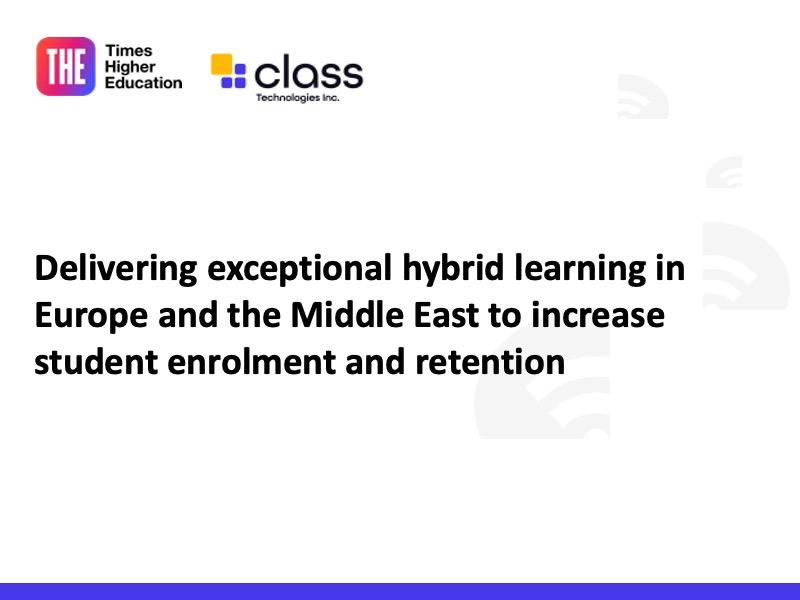Hybrid learning gives students the flexibility of attending class in person or online. However, to maximise student experience and engagement, universities must provide infrastructure and train faculty members to create equivalency wherever students learn, according to a panel of experts.
At a recent round table held in partnership between Times Higher Education and Class Technologies, leaders from academia and industry across the APAC region met to address the key challenges associated with achieving this goal.
Despite having technological devices that enable easy access to the internet, students who undertake hybrid learning need to learn to manage and regulate their time, noted Doune MacDonald, professor and pro vice-chancellor at the University of Queensland. “Something that we are working on now with all students is for them to learn to be independent learners and to be ready for lifelong learning,” she said.
Hybrid learning also increases operational costs. Because of this, it is important that universities invest in the right areas to support it. MacDonald added that to conduct hybrid learning effectively, universities need to invest in “design-built learning experiences, purposefully designed assessments and pedagogy supported [by] a tutor.”
Julie Lindsay, senior education technology advisor at the University of Southern Queensland, emphasised that with hybrid learning universities must create equivalent experiences for students, irrespective of whether they attend classes in-person or online. “This is where we must build stronger resources, stronger capacity amongst our staff, find better tools,” she explained.
Universities must also train teaching staff to facilitate classes effectively both in-person and online.
Institutions can “better support their teachers with an infrastructure that allows them to use the skills that they have developed in terms of engaging the classroom,” said Leslie Wee, head of APAC and Japan at Class Technologies, “and slowly apply [it] across the hybrid space.”
“We already have a centre dedicated to training and staff development. We call it the Centre for Development of Academy Excellence,” said Narimah Samat, deputy vice-chancellor (academic and international) at Universiti Sains Malaysia, citing an example of how this can be delivered. “We have dedicated it to deliver effective and impactful programmes, as well as the latest education technology tools that are essential for teaching and learning.”
Herma Dina Setiabudi, director (rankings and branding) at Universiti Malaysia Pahang, shared details of similar initiatives at her university. The Centre of Instructional Resources and e-Learning is used “to combine all e-learning materials…we can share with students to have online learning.” Universiti Malaysia Pahang also assists students with online examinations in hybrid learning with the implementation of UMP Digital’s Assessment System (UDAS).
The panellists agreed that universities are taking steps to equip faculty members with the skills to adapt better to hybrid learning, but Wee added that with “relevant indicators or feedback”, faculty members can be trained to monitor the students’ progress in class, especially those attending online, as part of taking further steps to strengthen student engagement in hybrid learning.
The panel:
- Mohd Zariat Abdul Rani, director of Centre for Academic Development, Universiti Putra Malaysia
- Chris Campbell, sub dean of learning technology and associate professor, Charles Sturt University
- Jose Antonio Clemente, professor under the department of psychology, University of the Philippines Diliman
- Jo-Anna Ferreira, dean (learning and teaching future), University of the Southern Queensland
- Kamila Ghazali, vice-chancellor, International University of Malaya Wales
- Gitanjali Goswami, branded content manager (APAC), Times Higher Education (chair)
- Desmond Khoh, channel enablement manager, Class Technologies
- Julie Lindsay, senior education technology advisor, University of the Southern Queensland
- Doune Macdonald, professor and pro vice-chancellor (teaching and learning), University of Queensland
- Yusep Rosmansyah, professor and director of education development, Bandung Institute of Technology
- Narimah Samat, deputy vice-chancellor (academic and sustainability), Universiti Sains Malaysia
- Herma Dina Setiabudi, associate professor and deputy director (rankings and branding division), Universiti Malaysia Pahang
- Benjamin Wah, provost, The Chinese University of Hong Kong
- Leslie Wee, head (APAC and Japan), Class Technologies
- Caroline Wong, associate dean of learning and teaching and senior lecturer, James Cook University Singapore
- Trev Wood, manager (education platforms), Monash University
Watch the webinar on demand above or on the THE Connect YouTube channel.
Find out more about Class Technologies.


comment